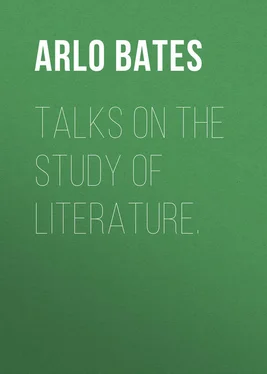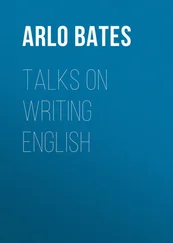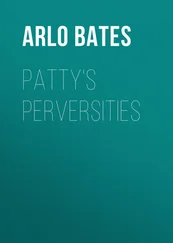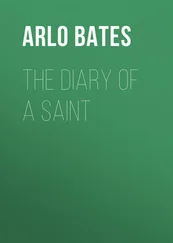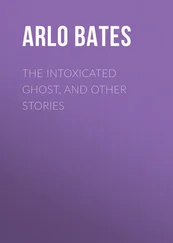Arlo Bates - Talks on the study of literature.
Здесь есть возможность читать онлайн «Arlo Bates - Talks on the study of literature.» — ознакомительный отрывок электронной книги совершенно бесплатно, а после прочтения отрывка купить полную версию. В некоторых случаях можно слушать аудио, скачать через торрент в формате fb2 и присутствует краткое содержание. Жанр: foreign_antique, foreign_prose, на английском языке. Описание произведения, (предисловие) а так же отзывы посетителей доступны на портале библиотеки ЛибКат.
- Название:Talks on the study of literature.
- Автор:
- Жанр:
- Год:неизвестен
- ISBN:нет данных
- Рейтинг книги:5 / 5. Голосов: 1
-
Избранное:Добавить в избранное
- Отзывы:
-
Ваша оценка:
- 100
- 1
- 2
- 3
- 4
- 5
Talks on the study of literature.: краткое содержание, описание и аннотация
Предлагаем к чтению аннотацию, описание, краткое содержание или предисловие (зависит от того, что написал сам автор книги «Talks on the study of literature.»). Если вы не нашли необходимую информацию о книге — напишите в комментариях, мы постараемся отыскать её.
Talks on the study of literature. — читать онлайн ознакомительный отрывок
Ниже представлен текст книги, разбитый по страницам. Система сохранения места последней прочитанной страницы, позволяет с удобством читать онлайн бесплатно книгу «Talks on the study of literature.», без необходимости каждый раз заново искать на чём Вы остановились. Поставьте закладку, и сможете в любой момент перейти на страницу, на которой закончили чтение.
Интервал:
Закладка:
To be literature a work must express sincere emotion; but how is feeling which is genuine to be distinguished from that which is affected? All that has been said must be regarded as simply theoretical and of very little practical interest unless there be some criterion by which this question may be settled. Manifestly we cannot so far enter into the consciousness of the writer as to tell whether he does or does not feel what he expresses; it can be only from outward signs that we judge whether his imagination has first made real to him what he undertakes to make real for others.
Something may be judged by the amount of seriousness with which a thing is written. The air of sincerity which is inevitable in the genuine is most difficult to counterfeit. What a man really feels he writes with a certain earnestness which may seem indefinite, but which is sufficiently tangible in its effects upon the reader. More than by any other single influence mankind has in all its history been more affected by the contagion of belief; and it is not easy to exaggerate the susceptibility of humanity to this force. Vague and elusive as this test of the genuineness of emotion might seem, it is in reality capable of much practical application. We have no trouble in deciding that the conventional rhymes which fill the corners of the newspapers are not the product of genuine inner stress. We are too well acquainted with these time-draggled rhymes of "love" and "dove," of "darts" and "hearts," of "woe" and "throe;" we have encountered too often these pretty, petty fancies, these twilight musings and midnight moans, this mild melancholy and maudlin sentimentality. We have only to read these trig little bunches of verse, tied up, as it were, with sad-colored ribbons, to feel their artificiality. On the other hand, it is impossible to read "Helen of Kirconnel," or Browning's "Prospice," or Wordsworth's poems to Lucy, without being sure that the poet meant that which he said in his song with all the fervor of heart and imagination. A reader need not be very critical to feel that the novels of the "Duchess" and her tribe are made by a process as mechanical as that of making paper flowers; he will not be able to advance far in literary judgment without coming to suspect that fiction like the pleasant pot-boilers of William Black and W. Clark Russell, if hand-made, is yet manufactured according to an arbitrary pattern; but what reader can fail to feel that to Hawthorne "The Scarlet Letter" was utterly true, that to Thackeray Colonel Newcome was a creature warm with human blood and alive with a vigorous humanity? Theoretically we may doubt our power to judge of the sincerity of an author, but we do not find this so impossible practically.
Critics sometimes say of a book that it is or is not "convincing." What they mean is that the author has or has not been able to make what he has written seem true to the imagination of the reader. The man who in daily life attempts to act a part is pretty sure sooner or later to betray himself to the observant eye. His real self will shape the disguise under which he has hidden it; he may hold out the hands and say the words of Esau, but the voice with which he speaks will perforce be the voice of Jacob. It is so in literature, and especially in literature which arouses the perceptions by an appeal to the imagination. The writer must be in earnest himself or he cannot convince the reader. To the man who invents a fiction, for instance, the story which he has devised must in his imagination be profoundly true or it will not be true to the audience which he addresses. To the novelist who is "convincing," his characters are as real as the men he meets in his walks or sits beside at table. It is for this reason that every novelist with imagination is likely to find that the fictitious personages of his story seem to act independently of the will of the author. They are so real that they must follow out the laws of their character, although that character exists only in imagination. For the author to feel this verity in what he writes is of course not all that is needed to enable him to convince his public; but it is certain that he is helpless without it, and that he cannot make real to others what is not real to himself.
In emotion we express the difference between the genuine and the counterfeit by the words "sentiment" and "sentimentality." Sentiment is what a man really feels; sentimentality is what he persuades himself that he feels. The Bad Boy as a "blighted being" is the type of sentimentalists for all time. There is about the same relation between sentimentality and sentiment that there is between a paper doll and the lovely girl that it represents. There are fashions in emotions as there are fashions in bonnets; and foolish mortals are as prone to follow one as another. It is no more difficult for persons of a certain quality of mind to persuade themselves that they thrill with what they conceive to be the proper emotion than it is for a woman to convince herself of the especial fitness to her face of the latest device in utterly unbecoming headgear. Our grandmothers felt that proper maidenly sensibility required them to be so deeply moved by tales of broken hearts and unrequited affection that they must escape from the too poignant anguish by fainting into the arms of the nearest man. Their grandchildren to-day are neither more nor less sincere, neither less nor more sensible in following to extremes other emotional modes which it might be invidious to specify. Sentimentality will not cease while the power of self-deception remains to human beings.
With sentimentality genuine literature has no more to do than it has with other human weaknesses and vices, which it may picture but must not share. With sentiment it is concerned in every line. Of sentiment no composition can have too much; of sentimentality it has more than enough if there be but the trace shown in a single affectation of phrase, in one unmeaning syllable or unnecessary accent.
There are other tests of the genuineness of the emotion expressed in literature which are more tangible than those just given; and being more tangible they are more easily applied. I have said that sham sentiment is sure to ring false. This is largely due to the fact that it is inevitably inconsistent. Just as a man has no difficulty in acting out his own character, whereas in any part that is assumed there are sure sooner or later to be lapses and incongruities, so genuine emotion will be consistent because it is real, while that which is feigned will almost surely jar upon itself. The fictitious personage that the novelist actually shapes in his imagination, that is more real to him than if it stood by his side in solid flesh, must be consistent with itself because it is in the mind of its creator a living entity. It may not to the reader seem winning or even human, but it will be a unit in its conception and its expression, a complete and consistent whole. The poem which comes molten from the furnace of the imagination will be a single thing, not a collection of verses more or less ingeniously dovetailed together. The work which has been felt as a whole, which has been grasped as a whole, which has as a whole been lived by that inner self which is the only true producer of art, will be so consistent, so unified, so closely knit, that the reader cannot conceive of it as being built up of fortuitous parts, or as existing at all except in the beautiful completeness which genius has given it.
What I mean may perhaps be more clear to you if you take any of the little tinkling rhymes which abound, and examine them critically. Even some of more merit easily afford example. Take that pleasant rhyme so popular in the youth of our fathers, "The Old Oaken Bucket," and see how one stanza or another might be lost without being missed, how one thought or another has obviously been put in for the rhyme or to fill out the verse, and how the author seems throughout always to have been obliged to consider what he might say next, putting his work together as a joiner matches boards for a table-top. Contrast this with the absolute unity of Wordsworth's "Daffodils," Keats' "Ode on a Grecian Urn," Shelley's "Stanzas Written in Dejection," or any really great lyric. You will perceive the difference better than any one can say it. It is true that the quality of which we are speaking is sufficiently subtile to make examples unsatisfactory and perhaps even dangerous; but it seems to me that it is not too much to say that any careful and intelligent reader will find little difficulty in feeling the unity of the masterpieces of literature.
Читать дальшеИнтервал:
Закладка:
Похожие книги на «Talks on the study of literature.»
Представляем Вашему вниманию похожие книги на «Talks on the study of literature.» списком для выбора. Мы отобрали схожую по названию и смыслу литературу в надежде предоставить читателям больше вариантов отыскать новые, интересные, ещё непрочитанные произведения.
Обсуждение, отзывы о книге «Talks on the study of literature.» и просто собственные мнения читателей. Оставьте ваши комментарии, напишите, что Вы думаете о произведении, его смысле или главных героях. Укажите что конкретно понравилось, а что нет, и почему Вы так считаете.
